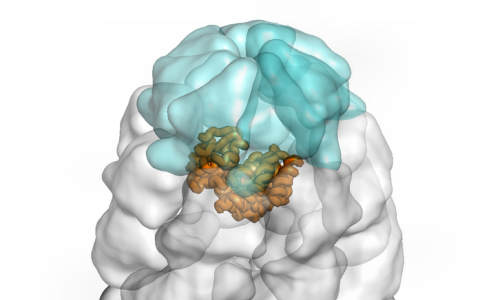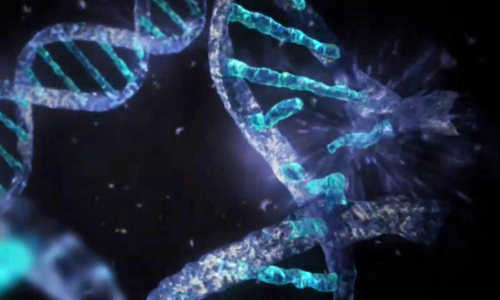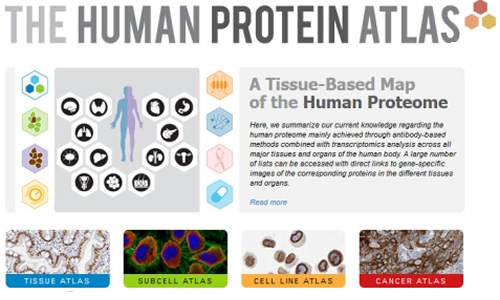Proteins are responsible for nearly every essential process of life. Their form and structure (or their ”fold”) are of crucial importance for their functionality. Scientists at the Max Planck Insti-tute of Biochemistry (MPIB) in Martinsried near Munich have recently discovered a so far un-known sequence of reactions which is necessary for newly generated proteins to acquire their correct structure. „In the mechanism we found, the folding is accomplished in a number of fast intermediate steps rather than in one single block“, explains Manajit Hayer-Hartl, research group leader at the MPIB. „Because this mode of action is energetically more favorable, the pro-teins are folded not only correctly, but also much faster than previously assumed.“ The results of the study have now been published in the Journal Cell.
GroEL/ES nano-cage (light blue and white) with encapsulated substrate protein (orange). Photo Credits: Dr. Andreas Bracher © MPI of Biochemistr
Proteins are the workhorses of the cell and thus responsible for almost all biological functions in-cluding metabolism, signal transmission or the determination of the cell’s shape. However, before they can fulfill their various tasks, the chain-like molecules must first adopt an intricate three-dimensional conformation. This process is called protein folding and is one of the most important processes in biology. In fact, in the event of improper folding, proteins are often no more able to carry out their duties, or even tend to clump together in aggregates. This in turn can lead to severe diseases like Alzheimer’s or Parkinson’s. In order to avoid this, specialized proteins, the so-called chaperones, help other proteins to adopt their proper shape.
The bacterial chaperones GroEL and GroES serve as an example for this principle: together, they build up a cage-like structure in which they encapsulate new, not yet folded proteins, thereby al-lowing them to fold properly. However, the exact way in which this is accomplished has so far been unclear and is a research topic of the MPIB team led by Manajit Hayer-Hartl and F. Ulrich Hartl, in collaboration with John Engen from Northeastern University in Boston.
Active acceleration of folding
„Our results demonstrate that the chaperones not only prevent protein clumping, but also dramatically accelerate the folding process”, explains Florian Georgescauld, scientist at the MPIB. „Surprisingly, the chaperones achieve this by changing the mechanism of folding: Instead of folding in one large single block, the protein gets its final structure in a series of small, rapid steps – like an elaborate high-speed Origami.” The researchers think that splitting up the reaction might render it energetically more favorable, which in turn would lead to increased speed. Hence, the folding process is finished in a few seconds rather than in several minutes.
The study shows for the first time that chaperones can act not only passively, by preventing aggregation, but as an active folding cage that catalyzes the folding process. This results in a high-speed folding mechanism which is of particular biological relevance, so the researchers say, since in this way proteins can be folded faster than they are produced. Thus, a backlog of proteins which are not yet or improperly folded and the disastrous consequences which might go along with this can be avoided.
Story Source:
The above story is based on materials provided by Max Planck Insti-tute of Biochemistry .





